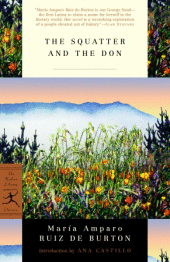Francesca Cricchio
Journal for Ruiz de Burton
English 48B
February 3rd, 2011
“Don Mariano had been for some years under the lash of the maternal government, whom he had found a cruel stepmother, indeed.” (93)
“Ruiz de Burton works within many established literary traditions. She follows the historical romance tradition set by contemporary British, French, Spanish, and Mexican writers, but she also incorporates American modes of realism and naturalism later made popular by writers such as Theodore Dreiser and Frank Norris.” Describing Ruiz de Burton from Cengage Learning website.
Maria Amparo Ruiz de Burton’s literary piece, “The Squatter and the Don” paints to tale of Don Mariano. An elder native of California who slowly loses his land when squatters move in and build homes on his property. Is the story, Don tries to negotiate with the squatters and convince them to plant Fruit trees and vineyards instead of grains because it will bring more prosperity. The squatters are adamant to Don’s proposal, and think that he has other motives. Don suggests building reservoirs to maintain a water supply, and to raise cattle for capital as well. The entire chapter is spent with Don trying to convince the men to change their ways, and them being unsure. As a woman who lived on a ranch as well, Ruiz uses this story to demonstrate the unfair actions that came with new laws.
I found it to be incredibly smart how Ruiz created a character (Don Mariano) that was so genius and clever in the way that he proposed a plan that would indirectly benefit himself and his family. With a thick layer of irony surfacing this story, I was both amazed and appalled with what what happening to Don’s land. At the beginning of the chapter we learn that squatters (most definitely younger in age than Don) have come on to Don’s thousand acre ranch and built homes for themselves. In fact, the interaction between Don and the newcomers takes place on the “broad Piazza of John Gasbang’s house, this being the most central point in the rancho” (94). Gasbang, who is a squatter can be seen as one of the central problems of Don’s land being taken over. Thus, Ruiz ironically places Gasbang’s newfound home in the center of Don’s land to foreshadow the dominance of this new group.
The irony continues when the two groups converse and discuss how long the meeting will last. The newcomers agree to talk until whenever, but must leave before nightfall to “bring the milch cows home” (95), which are, in fact, Don’s milk cows that they stole from him. Don cleverly responds with “Exactly, we want to look after our cows too” (95) as if to make the squatters feel like they still have ownership by completely ignoring that fact that the cows they are referring to as theirs are actually his.
Throughout Don’s entire proposal, I can see the cleverness in the way he goes about business. By referring to the future not as “his” but as “ours” he makes the squatters feel like they are the future of the land, and if they do just this simple task (plant fruit trees instead of grain) they will prosper. The language Ruiz uses for Don makes him sounds so clever. “I hope to have the opportunity to thank you for your kin co-operation” and “If you don’t understand me I will repeat my words until I make my meaning clear” (95) writes Ruiz. These two sentences are laced with such a subtle sense of irony, that it’s almost missed when reading for the first time. Don is almost saying to the squatters face “this is how we are going to do things, and I hope will repeat myself until there will no longer be any argument in my proposal”.
For a man who has lost almost everything, it is amazing to watch him speak to these thief's so calmly and diplomatically. If I were in his situation, I would find it very hard to keep my composure around the very people who stripped me of my land and prosperity. But by creating a character that is so collected and intelligent, we see how Ruiz tries to have Don befriend the squatters so that he can gain back his land that was taken away by the very people he is talking to. It almost makes me think of the phrase “keeps your friends close, and your enemies closer”, and that is exactly what Don did.

